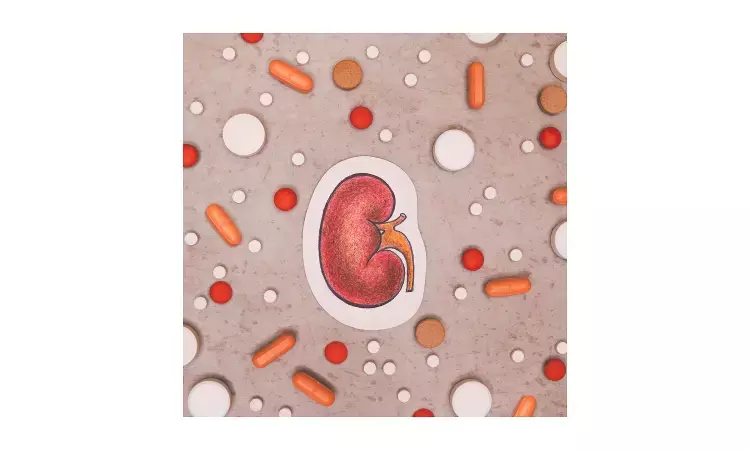- Home
- Medical news & Guidelines
- Anesthesiology
- Cardiology and CTVS
- Critical Care
- Dentistry
- Dermatology
- Diabetes and Endocrinology
- ENT
- Gastroenterology
- Medicine
- Nephrology
- Neurology
- Obstretics-Gynaecology
- Oncology
- Ophthalmology
- Orthopaedics
- Pediatrics-Neonatology
- Psychiatry
- Pulmonology
- Radiology
- Surgery
- Urology
- Laboratory Medicine
- Diet
- Nursing
- Paramedical
- Physiotherapy
- Health news
- Fact Check
- Bone Health Fact Check
- Brain Health Fact Check
- Cancer Related Fact Check
- Child Care Fact Check
- Dental and oral health fact check
- Diabetes and metabolic health fact check
- Diet and Nutrition Fact Check
- Eye and ENT Care Fact Check
- Fitness fact check
- Gut health fact check
- Heart health fact check
- Kidney health fact check
- Medical education fact check
- Men's health fact check
- Respiratory fact check
- Skin and hair care fact check
- Vaccine and Immunization fact check
- Women's health fact check
- AYUSH
- State News
- Andaman and Nicobar Islands
- Andhra Pradesh
- Arunachal Pradesh
- Assam
- Bihar
- Chandigarh
- Chattisgarh
- Dadra and Nagar Haveli
- Daman and Diu
- Delhi
- Goa
- Gujarat
- Haryana
- Himachal Pradesh
- Jammu & Kashmir
- Jharkhand
- Karnataka
- Kerala
- Ladakh
- Lakshadweep
- Madhya Pradesh
- Maharashtra
- Manipur
- Meghalaya
- Mizoram
- Nagaland
- Odisha
- Puducherry
- Punjab
- Rajasthan
- Sikkim
- Tamil Nadu
- Telangana
- Tripura
- Uttar Pradesh
- Uttrakhand
- West Bengal
- Medical Education
- Industry
Laxatives improve hyperkalemia in CKD patients but not in dialysis patients: Study

Memphis, TN: A recent study published in the Journal of the American Society of Nephrology reported that laxative use may lower the risk of hyperkalemia in patients with advanced chronic kidney disease (CKD). The findings support the therapeutic potential of laxatives for hyperkalemia management in advanced CKD and also support a putative role of constipation in potassium disarrays.
Chronic kidney disease causes an increase in serum potassium levels is associated with decreased renal ion excretion. Laxatives are used as medications to reduce the progression of CKD and hyperkalemia.
Keiichi Sumida, University of Tennessee Health Science Center, Memphis, Tennessee, and colleagues aimed to evaluate the effect of laxatives on chronic kidney disease patients to overcome hyperkalemia.
The study population encompassed 36,116 United States veterans transitioning to ESKD from 2007 to 2015 with greater than or equal to one plasma potassium measurement during the last 1-year period before ESKD transition. Using generalized estimating equations with adjustment for potential confounders, they examined the association of time-varying laxative use with risk of dyskalemia (i.e., hypokalemia [potassium <3.5 mEq/L] or hyperkalemia [>5.5 mEq/L]) versus normokalemia (3.5–5.5 mEq/L) over the 1-year pre-ESKD period. To avoid potential overestimation of dyskalemia risk, potassium measurements within 7 days following a dyskalemia event were disregarded in the analyses.
A total of 319,219 over the last one-year pre-ESKD period, there were repeated potassium measurements in the cohort study.
Out of these, it was found 12,787 (4.0%) represented hypokalemia, and 15,842 (5.0%) represented hyperkalemia; the time-averaged potassium measurement was 4.5 mEq/L.
The results of the study were:
• After multivariable adjustment, time-varying laxative use (compared with nonuse) was significantly associated with lower risk of hyperkalemia (adjusted odds ratio [aOR], 0.79)
• It was found that it was not associated with the risk of hypokalemia (aOR, 1.01). The results were robust to several sensitivity analyses.
Dr. Sumida and the team concluded that "Laxative use was independently associated with lower risk of hyperkalemia during the last 1-year pre-ESKD period. Our findings support a putative role of constipation in potassium disarrays and also support (with careful consideration for the risk-benefit profiles) the therapeutic potential of laxatives in hyperkalemia management in advanced CKD."
Reference:
The study titled, "Laxative Use and Risk of Dyskalemia in Patients with Advanced CKD Transitioning to Dialysis," is published in the Journal of the American Society of Nephrology.
DOI: https://jasn.asnjournals.org/content/32/4/950
Medical Dialogues consists of a team of passionate medical/scientific writers, led by doctors and healthcare researchers. Our team efforts to bring you updated and timely news about the important happenings of the medical and healthcare sector. Our editorial team can be reached at editorial@medicaldialogues.in.
Dr Kamal Kant Kohli-MBBS, DTCD- a chest specialist with more than 30 years of practice and a flair for writing clinical articles, Dr Kamal Kant Kohli joined Medical Dialogues as a Chief Editor of Medical News. Besides writing articles, as an editor, he proofreads and verifies all the medical content published on Medical Dialogues including those coming from journals, studies,medical conferences,guidelines etc. Email: drkohli@medicaldialogues.in. Contact no. 011-43720751


